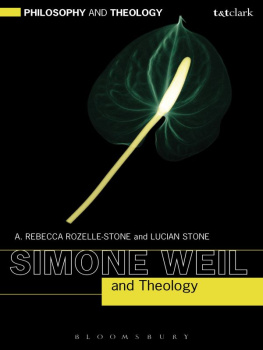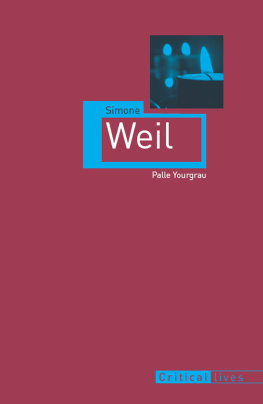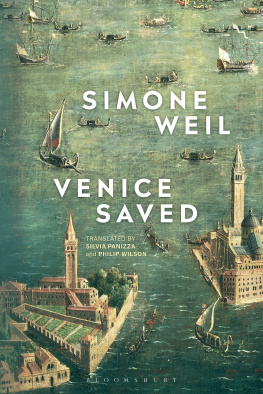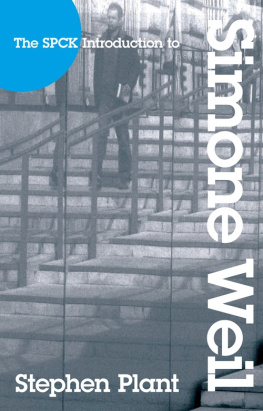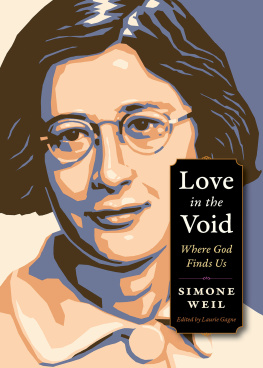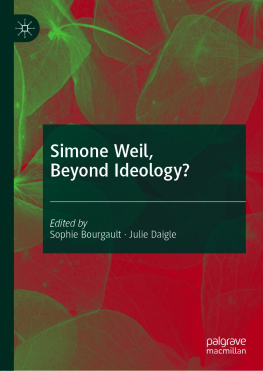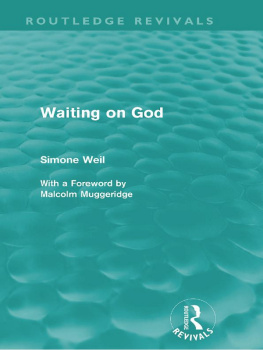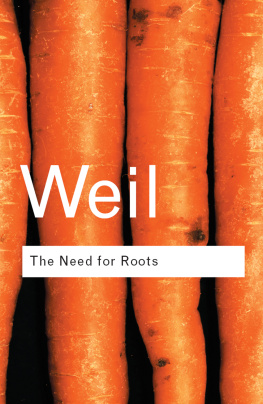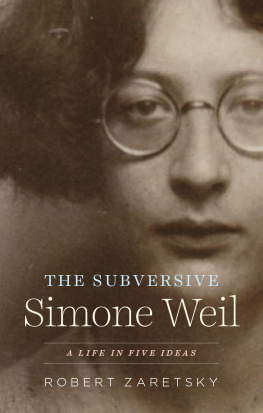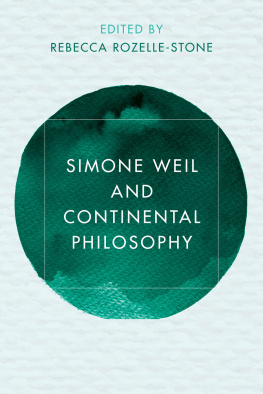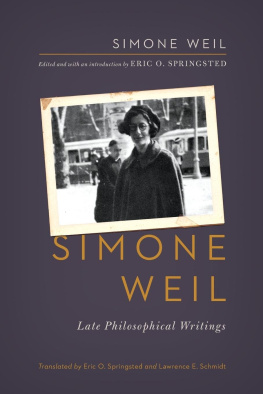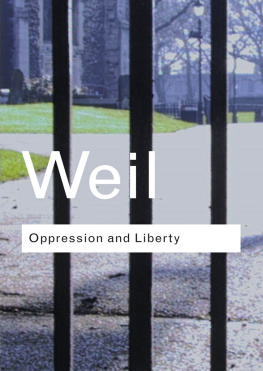Simone Weil and Theology
A. Rebecca Rozelle-Stone
and
Lucian Stone

Bloomsbury T&T Clark
An imprint of Bloomsbury Publishing Plc
50 Bedford Square London WC1B 3DP UK
175 Fifth Avenue New York NY 10010 USA
www.bloomsbury.com
First published 2013
A. Rebecca Rozelle-Stone and Lucian Stone, 2013
All rights reserved. No part of this publication may be reproduced or transmitted in any form or by any means, electronic or mechanical, including photocopying, recording, or any information storage or retrieval system, without prior permission in writing from the publishers.
A. Rebecca Rozelle-Stone and Lucian Stone have asserted their right under the Copyright, Designs and Patents Act, 1988, to be identified as Author of this work.
No responsibility for loss caused to any individual or organization acting on or refraining from action as a result of the material in this publication can be accepted by Bloomsbury Academic or the author.
British Library Cataloguing-in-Publication Data
A catalogue record for this books is available from the British Library.
ISBN: 978-0-5674-2430-3
For
Thomas Alexander, Anthony Steinbock, and Stephen Tyman, three exemplary teachers who embody and inspire the love of wisdom
CONTENTS
Our thinking about Simone Weil has benefited in immeasurable ways from our participation at the annual colloquies hosted by the American Weil Society. The members of the society and the participants at the annual colloquies are always patient, thoughtful, and convivial. It was during these annual meetings that many of the ideas in this present volume came to fruition, and for that we are thankful. We also want to express our appreciation and gratitude to E. Jane Doering, Larry Schmidt, and Eric O. Springsted who have been especially generous with their valuable support and considerable wisdom about Weils life and thought. Finally, we want to thank Charles Miller who is an open and attentive interlocutor on all theological matters, offering us many inspirations as we worked through ideas presented in this book.
A. Rebecca Rozelle-Stone and Lucian Stone
Grand Forks, ND
| FLN | First and Last Notebooks, trans. Richard Rees. London: Oxford University Press, 1970. |
| FW | Formative Writings 19291941, trans. Dorothy Tuck McFarland and Wilhelmina van Ness. Amherst: University of Massachusetts Press, 1987. |
| GG | Gravity and Grace, trans. Emma Crawford and Mario von der Ruhr. London: Routledge, 2002. |
| IC | Intimations of Christianity among the Ancient Greeks, trans. E. C. Geissbuhler. London: Routledge, 1988. |
| LOP | Lectures on Philosophy, trans. Hugh Price. Cambridge: Cambridge University Press, 1978. |
| LP | Letter to a Priest, trans. Arthur Wills. London: Routledge, 2002. |
| NB | The Notebooks of Simone Weil, 2 vols, trans. Arthur Wills. London: Routledge & Kegan Paul, 2004. |
| NR | The Need for Roots, trans. Arthur Wills. London: Routledge, 2002. |
| OL | Oppression and Liberty, trans. Arthur Wills and John Petrie. Amherst: University of Massachusetts Press, 1973. |
| SL | Seventy Letters, trans. Richard Rees. New York: Oxford University Press, 1965. |
| SNL | On Science, Necessity, and the Love of God, trans. Richard Rees. London: Oxford University Press, 1968. |
| SWA | Simone Weil: An Anthology, ed. Sin Miles. New York: Weidenfeld and Nicolson, 1986. |
| SWC | Simone Weil on Colonialism, ed. and trans. J. P. Little. New York: Rowman and Littlefield, 2003. |
| SWR | Simone Weil Reader, ed. George A. Panichas. Wakefield, RI and London: Moyer Bell, 1977. |
| WG | Waiting for God, trans. Emma Craufurd. New York: HarperCollins, 2001. |
Introduction:
On being a paradox
To think on God, to love God, is nothing else than a certain way of thinking on the world.
SIMONE WEIL
Simone Weil once wrote, The Gospel contains a conception of human life, not a theology. By this statement she did not intend a criticism. On the contrary, she was proposing a new orientation toward sacred text in which flesh and blood encounters, rather than propositions about the divine, are revealed. As philosophers, theologians, and literary critics have long understood, there are always interpretive difficulties to be faced whenever we read sacred texts, or in general, whenever we read texts that are poetic in nature. This is partly owing to the fact that a poem (whether sanctified or not) grants a glimpse of human life in a singular way that ruptures our usual systems of perceiving and knowing. Alain Badiou has helpfully described why contemporary audiences are especially handicapped in reading poetic texts:
Poetry, alas, grows more and more distant. What commonly goes by the name of culture forgets the poem. This is because poetry does not easily suffer the demand for clarity, the passive audience, the simple message. The poem is an intransigent exercise. It is devoid of mediation and hostile to the media.
A poem, that is, can foster an epiphany but does not didactically disclose a set of facts; poetry does not consist in communication, but it awaits us to be encountered as an event, and it even injects a kind of silence into the cacophonies that mask our banalities.form; she does not communicate a theology but instead reveals a conception of human life, albeit in paradoxical ways.
Thinking about poetry has more to teach us, especially in preparation for encountering the writings of Simone Weil. How does a good poem come about?
Weil herself had this to say about the composition of a poem: it requires thought without language, for the choice of words takes place without the help of words. We quote him at length on the process by which one can write a verse of poetry:
For the sake of a single verse, one must see many cities, men and things, one must know the animals, one must feel how the birds fly and know the gesture with which the little flowers open in the morning. One must be able to think back to roads in unknown regions, to unexpected meetings and to partings one had long seen coming; to days of childhood that are still unexplained... and it is not yet enough if one may think of all this. One must have memories of many nights of love, none of which was like the others, of the screams of women in labor.... But one must also have been beside the dying, must have sat beside the dead in the room with the open window and the fitful noises. And still it is not yet enough
A verse containing a true conception of human life, whether within poetry or sacred text, is not manufactured consciously. Given Rilkes account, the requisite elements appear to be: vulnerable and attentive engagement in the world; consent to suffer the uncertainties, contradictions, mysteries, and necessities of mortal life; formation of thoughts and memories of those experiences; and willingness to let go of those considerations in order for an incarnation to take placean embodiment of the past encounters, which then seep into our movements, gazes, conversations, and, occasionally, our verses, sometimes unbeknownst to us. There is something paradoxical about detaching from our carefully constructed narratives in order for a truly inspired word to arrive, outside of our active energies. The incessant systematizing and intellectualizing of experience must at some point give way to releasing that rational control of what presented itself to our senses for it, metaphorically speaking, to mature on the tree. In addition to this detachment, then, there must also be patience for the ripening. For as Rilke also wrote, One ought to wait and gather sense and sweetness a whole life long, and a long life if possible, and then, quite at the end, one might perhaps be able to write ten lines that were good.
Next page
